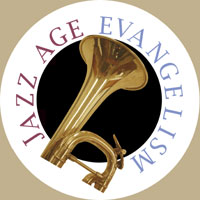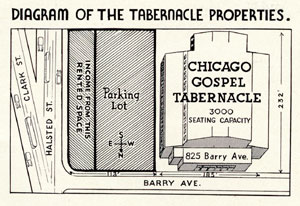

|
Building
|
 |
Map
showing the Tabernacle andits immediate surroundings. Ca. 1932. Click
image above to see enlargment. |
Excerpt (8 minutes) from tape T8 in Collection 38, oral history interview with daughter Pauline Rader Noll recorded in August 1984.
NOLL: Because his...it was...the next thing we knew, they were building the Tabernacle that he had on Clark, Barry and Halstead, which was further north than...than the Moody Church. And it was to be a summer affair. Nobody thought it was going to be anything more than a summer meeting. And it was to be a steel tent rather than a canvas tent, so it had a great big roof and steel barriers to hold up the roof and then the seats and there was a gravel road...a gravel floor and wooden bench seats. The platform at the Tabernacle was a great big high thing. It was the most horrible thing to talk from, but there was a great big sounding board above it. Of course, this was all in the days before microphones, buildings were different, acoustics were different. And my father evidently needed space to move around. He didn't move as much as Billy Sunday, but he sure moved. And he always waved his arms a lot, because he was very expressive in the way that he talked. He didn't stand and just read from notes. In fact, my father's notes of any sermon were never more than a little piece of scratch paper, and even that not most of the time. He did it all straight from memory. He used to have a couple of notes he'd have on the side of his Bible, but I don't remember him ever stopping and reading anything or even glancing down unless he was reading the Scriptures. This Tabernacle not only had a big platform, but it was a big...a big platform for the choir, 'cause it was a big choir and then there was a great big section that was for the band. And there was the organ and the piano. But when winter came, the people wanted to go on and they still wanted to keep the Tabernacle. And then's when it became...be called the Gos...Chicago Gospel Tabernacle. And they closed it in and put stoves in. These were great big pot belly stoves. I think there were either four or six. And the place did seat, they said, five thousand, and I think it did before they put the sides in. Then it must have gone done to about thirty-five hundred. And it was always full, especially Sunday night. Talking about any typical day at the Tabernacle and, of course, my life was the Tabernacle at that time. I was teenager and I was very much in it with the youth and all the work that we did. And the people that worked with my father were all young. There was Merrill Dunlop who played the organ, Lance [Latham] was at the piano, Clarence [Jones] who was part of the brass quartet and his brother Howard, they were all our age. Most of them are...oh, some of them were a little older, but most of them are the same age as I am. And we all group up together, let's say, in the Tabernacle. Sunday was the day that we were never any other place but the Tabernacle, even up all the years I was in college and everything. This tabernacle was my life. I think that was why it was so hard for me to adjust sometimes, because I was in college all week and then at the Tabernacle Saturday and Sunday, 'cause we had our youth meetings, a lot of them on Saturday. Sunday started, I think it was ten o'clock and we had a very dignified, almost what the Methodists call a worship service, but it was a very dignified service. There was not the band, only the organ and part of the choir that came Sunday morning. Then we always ate there after the...the service [?] had been going a while. They had a cafeteria and the ladies put it on. We used to have sandwiches and soup, and everybody stayed. Then by two o'clock, Sunday school started, and there were rooms, and there were side rooms, and then the big part had classes all over it. And this went for...on for most of the afternoon. Most of the time we weren't even through till four. Then there were some youth meetings at five, I think it was, somewhere along like that, until it was time for supper. Then we had another supper. Sometimes it was cafeteria, sometimes we went out, but we had our meal there. Then the whole service started at seven o'clock. And then the band would come and the big choir. And then, of course, later when radio started, this all became part of it. It was a big meeting and this is when the biggest crowds came. And it...the early days it was full and I mean full. They would have to announce sometimes for people to move along the bench so that everybody could get in. And with the gravel and those horrible stoves, it was fairly comfortable if you sat near enough to the stove, but if you weren't too near the stove, it could be pretty cold with those gravel floors. Speaking of week nights in the Tabernacle, they had a Wednesday night meeting. And it was never very big. I think most of the time it was in the side room. And if there was a Thursday night there, I don't even remember it. We had big meetings Saturday, because this is when the Boy Scouts and Girl Guides met in order to have their meeting. And we used to even play baseball Saturday out in the lot. Here's a good joke in a way. Maybe it doesn't come in out of this question, but speaking of baseball in regards. And some of used to go out there and play baseball on Saturday in this lot. And my father was so very proud of the fact that his daughter Pauline batted the ball and it went over all the billboards and hit one of the Halsted street cars and it broke the window. I don't think my father ever paid a bill that he enjoyed more, because you see, he didn't have any boys and he wanted boys very much. In fact, each one of us were named for a...a boy. Maybe before I get through all this I'll tell you how I got my name. But the fact is that our life at the Tabernacle was that way. Here we played ball in the afternoon, we had our meetings. We were around and about that place all the time. My last two years in college I had a car of my own. It was a Rio, if you've ever heard of it. It was green and had...you could put the top down and it had a mother-in-law seat in the back. All the kids in the Tabernacle, I think, had a ride in that car at some point or other. And sometimes we'd have as many as ten in there, all piled in and on the running board. And, of course, Lake Harbor was going then, which was the summer place. We were going back and forth. And these young people, and all who worked in the Tabernacle and were part of the program, were also part of our life. And this was what made it such a glorious time for all of us. I don't think there were too many worldly temptations for any of us 'cause we were so busy.
Leave the exhibit to read the descriptive guide of the Rader collection